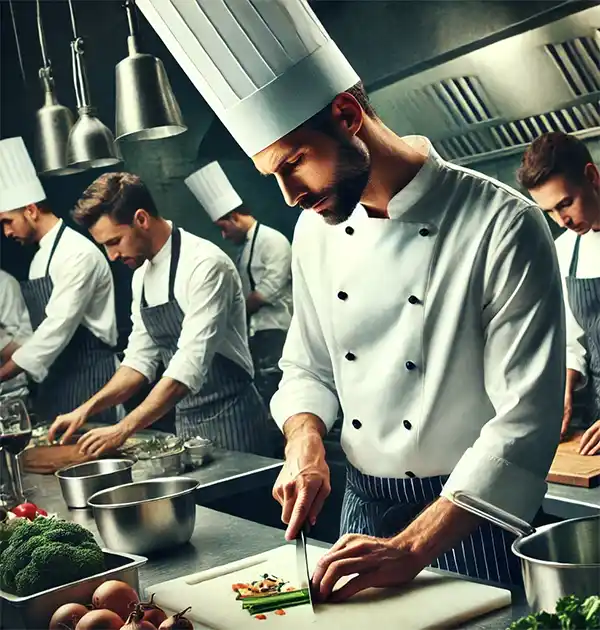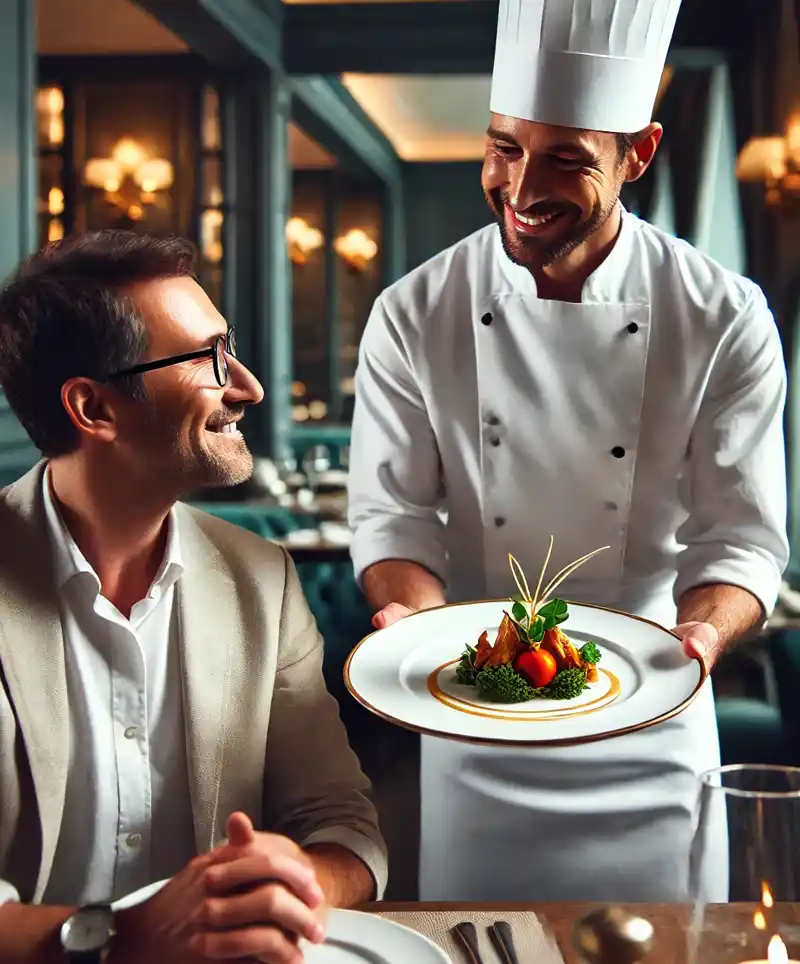On International Chefs Day, we tip our hats (preferably tall, white ones) to the culinary wizards who transform humble ingredients into works of art. Chefs are more than just skilled cooks—they are alchemists, magicians, and occasionally therapists to hungry patrons, all wrapped into one. They work in the chaotic, high-pressure environment of the kitchen, armed with nothing but knives, spatulas, and a seemingly supernatural ability to taste ten dishes at once without missing a beat.
The Origins of International Chefs Day
International Chefs Day was first celebrated in 2004, thanks to Dr. Bill Gallagher, a master chef and president of the World Association of Chefs Societies (WACS). It’s a day to not only recognize the talents of chefs around the world but also to inspire future generations to pursue culinary arts. Each year, International Chefs Day focuses on a theme—often centered around healthy eating or sustainability—because chefs don’t just cook; they educate and influence how we view food.
From Cook to Culinary Artist
Long before chefs became synonymous with prestige, television stardom, and culinary innovation, they were often relegated to the background as mere cooks, toiling away in smoky kitchens. Historically, their role was one of necessity, not artistry. Food preparation was focused more on survival and satisfying hunger than on flavor or presentation. The early chefs worked with what they had—often limited ingredients and rudimentary cooking methods—and had to make it not only edible but, in the best-case scenario, palatable.
It wasn't until the Renaissance, when the art of fine dining began to emerge among the European elite, that the role of the chef began to shift from simple sustenance provider to culinary architect. Royal courts started to demand more elaborate and luxurious meals, elevating food from a basic need to a form of entertainment and status. The chefs serving these aristocratic circles were no longer just feeding the household; they were creating experiences.
By the late 18th and early 19th centuries, particularly in France, the concept of haute cuisine took root, which emphasized elaborate dishes, detailed presentation, and a dining experience that was as much about spectacle as it was about taste. Chefs were no longer seen as servants—they were visionaries, orchestrating symphonies of flavors and textures to dazzle the senses. Their work started to gain recognition, and they began to be acknowledged for their skill and innovation.
One major turning point in the evolution of the chef was the establishment of the first modern restaurant in Paris in 1765, by a man named Boulanger, who offered patrons a menu and individual tables, freeing them from the fixed meals of inns and taverns. This revolutionary concept allowed chefs to have more creative control and flexibility, offering them a platform to showcase their talents. They could now craft their own menus, experiment with different ingredients, and elevate their personal style.
The Birth of the Celebrity Chef
While chefs like Auguste Escoffier are credited with bringing organization and refinement to the kitchen, it wasn't until much later that the idea of the "celebrity chef" came to fruition. In the 20th century, names like Julia Child, James Beard, and Jacques Pépin brought cooking into the living rooms of everyday people through books and television. They demystified cooking techniques, making gourmet food more accessible while simultaneously elevating their own status to cultural icons. Julia Child, with her larger-than-life personality, was instrumental in breaking down the intimidating walls of French cuisine for American audiences.
The rise of television and, more recently, social media has allowed chefs to move from the back of the kitchen to the forefront of pop culture. Shows like Top Chef, MasterChef, and The Great British Bake Off have not only made cooking competitive but have also allowed chefs to become household names. Today, chefs are more than culinary professionals—they are influencers, entrepreneurs, and even philanthropists, using their platform to advocate for food sustainability, health, and social change.
 In the modern kitchen, chefs are constantly walking the line between preserving the rich culinary traditions of the past and embracing the innovations of today. Techniques like molecular gastronomy, sous-vide, and fermentation have opened up entirely new ways to experience food. Chefs now play with the molecular structure of ingredients, deconstructing and reconstructing dishes to create unexpected textures and flavors.
In the modern kitchen, chefs are constantly walking the line between preserving the rich culinary traditions of the past and embracing the innovations of today. Techniques like molecular gastronomy, sous-vide, and fermentation have opened up entirely new ways to experience food. Chefs now play with the molecular structure of ingredients, deconstructing and reconstructing dishes to create unexpected textures and flavors.
But despite all the modern gadgetry and science that may come into play in high-end kitchens, the heart of a chef’s work remains deeply rooted in tradition. Many chefs today view their role as both protector of the past and explorer of the future. They honor time-tested recipes while simultaneously pushing boundaries to keep their work fresh, exciting, and, of course, delicious.
The culinary world has seen a shift toward using locally-sourced, sustainable ingredients and minimizing waste—a movement driven in large part by chefs who see their responsibility extending beyond the plate and into the community. Food has become a platform for chefs to tell stories, connect cultures, and even address global issues like climate change and food insecurity.
The Chef’s Journey
One key difference between a cook and a chef is the journey they take. In many culinary traditions, chefs begin their careers through rigorous apprenticeships, often working their way up from humble beginnings, like peeling potatoes or chopping onions. But it’s through these years of dedication, long hours, and relentless practice that they develop the skill, intuition, and creativity required to become true culinary artists.
Unlike other professions, where education might end with a degree, chefs are lifelong students of their craft. They are constantly learning—whether by experimenting with new ingredients, traveling to immerse themselves in global cuisines, or revisiting ancient techniques to reinterpret them for the modern palate. Becoming a chef is not just about mastering recipes, it’s about developing a culinary philosophy, where each dish is a reflection of the chef’s personal style and vision.
Today, chefs often take on multiple roles beyond the kitchen. They become mentors to young culinary talents, they lead efforts to revolutionize sustainable food sourcing, and many even open their own restaurants, becoming entrepreneurs and business leaders.
In short, the chef's journey from cook to culinary artist is one marked by creativity, innovation, and a deep passion for food that transcends mere sustenance. Through their work, chefs connect cultures, tell stories, and create memorable dining experiences that leave a lasting impact far beyond the kitchen.
The Great Divide
We’ve all had moments in our own kitchens where we thought we could be chefs. You know, that one time you made a decent omelette or grilled a piece of chicken without burning it beyond recognition. But the difference between home cooks and chefs is a vast, impassable gulf. Chefs don’t just cook—they orchestrate, command, and adapt on the fly like culinary chameleons.
A chef can juggle a dozen orders simultaneously, all while ensuring the risotto is perfectly creamy, the steak is seared to perfection, and the soufflé doesn’t collapse like your hopes during your last attempt at a family dinner. Meanwhile, the average home cook may find themselves in a panicked frenzy after one too many pots boil over, hastily Googling "what to do when your chicken is still raw on the inside but burnt on the outside."
Where Temperatures (and Tempers) Run High
Kitchens are known for their intense environments, and if you’ve ever watched a cooking show like Hell’s Kitchen, you might wonder if all chefs are actually secret drill sergeants in disguise. But behind the shouting and the fire (literal and metaphorical), there’s a lot of humor in the kitchen. Where else can you accidentally set a dish on fire and then proudly declare it “blackened” with a straight face?
The kitchen is also home to an array of jargon that would baffle most outsiders. “86” doesn’t mean someone is nearing their 90th birthday—it means a dish is no longer available. A “deuce” isn’t a sneaky bathroom break; it’s a table of two. And if someone yells “walking in,” don’t panic—it just means an order is coming through, not that a zombie apocalypse is happening.
More Than Just a Dish
Every great chef has a signature—a dish, a technique, or even a flair for presentation that sets them apart. For some, it’s their ability to craft the most delicate pastries known to man; for others, it’s their knack for combining flavors that have no business being in the same room but somehow work perfectly on the plate.
And then there are the chefs who are masters of the kitchen theatrics. Ever been to a restaurant where the chef casually tosses your shrimp in the air, catches it in his hat, and serves it to you with a flourish? That’s not just cooking—that’s showmanship, the culinary equivalent of juggling flaming swords (except the swords are shrimp, and the flames are actual flames).
How to Celebrate International Chefs Day
There are plenty of ways to celebrate International Chefs Day, and none of them involve setting your kitchen on fire. You could try making a new recipe in honor of the chefs who make it look easy, or better yet, give yourself a break and head to your favorite restaurant. After all, what better way to honor chefs than by letting them do what they do best—cook, create, and make magic with food?
If you’re feeling really adventurous, you could even try to impress a chef with your own culinary skills. Just be prepared for some feedback along the lines of, “It’s a little under-seasoned,” or “The presentation needs work.” (Translation: “Did you just throw everything on the plate in a blind panic?”)
Chefs are the backbone of the culinary world. They don’t just feed us—they nourish us, inspire us, and occasionally make us laugh at our own kitchen mishaps. Whether they’re creating Michelin-star masterpieces or just making sure your fries are crispy enough, chefs deserve our gratitude, especially on International Chefs Day. So, raise a fork (and maybe a fire extinguisher), and let’s give a round of applause to the culinary geniuses who make our meals memorable, one perfectly timed dish at a time.
Please Share our Content






 In the modern kitchen, chefs are constantly walking the line between preserving the rich culinary traditions of the past and embracing the innovations of today. Techniques like molecular gastronomy, sous-vide, and fermentation have opened up entirely new ways to experience food. Chefs now play with the molecular structure of ingredients, deconstructing and reconstructing dishes to create unexpected textures and flavors.
In the modern kitchen, chefs are constantly walking the line between preserving the rich culinary traditions of the past and embracing the innovations of today. Techniques like molecular gastronomy, sous-vide, and fermentation have opened up entirely new ways to experience food. Chefs now play with the molecular structure of ingredients, deconstructing and reconstructing dishes to create unexpected textures and flavors.








 "Sláinte!" is a traditional Irish expression used as a toast, equivalent to "Cheers!" in English.
"Sláinte!" is a traditional Irish expression used as a toast, equivalent to "Cheers!" in English.